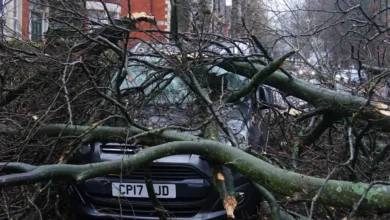
The number of new cars made in the UK fell sharply again last year, sinking to its lowest level since 1956. The drop marks a 10% fall from 2021, which itself was a historic low.
A continuing global shortage in semiconductor chips hit production lines, industry body the Society of Motor Manufacturers and Traders said.
But car makers are concerned the UK has not yet got a strategy to make the country competitive as a destination for manufacturing investment. The government said it was “determined” to ensure the country remains a top global location for car manufacturing. The SMMT said the UK produced 775,014 cars last year. In 2019, before the Covid pandemic, the UK had made 1.3 million vehicles.
Manufacturers hope that they will hit one million vehicles again in 2025, but getting to pre-pandemic levels would require major investment and new car makers to come to the UK. Firms are worried that the UK is falling behind the US and the EU when it comes to offering state aid to manufacturers.
A very significant bit of US legislation – the Inflation Reduction Act – will offer billions in subsidies to car makers who create electric vehicle supply chains in the US. Mike Hawes, chief executive of the SMMT, said this will “hoover up” a lot of international investment.
An angry EU is considering retaliating by either explicitly relaxing state aid rules or doing so under the guise of extending Covid recovery or green technology-boosting programmes.
One of the benefits of Brexit was meant to be escaping from the straitjacket of EU state aid rules which limited the amount of support governments could give to favoured industries.
Mr Hawes conceded the UK could be in the unenviable position of offering less support to crucial industries than we did before we left the EU.
Speaking to the BBC’s Today programme, he said the UK needed “something that demonstrates that the UK is open for business and open for these investments”.
The SMMT said the production figures were affected by the closure of Honda’s factory in Swindon in July 2021 and the fact that Vauxhall Astras have not been made at Ellesmere Port since April 2022.
Mr Hawes said the figures reflected how “tough” 2022 was for UK car manufacturing, although the country had still made more electric vehicles than ever before.
“The potential for this sector to deliver economic growth by building more of these zero-emission models is self-evident; however, we must make the right decisions now,” he said.
He told the BBC the global car industry had already begun investing in electric vehicles and batteries and the UK only had “a few years” to act.
“We need to be on the front foot making sure we have a range of measures that attract investment,” Mr Hawes said. He called for a strategy to accelerate battery production and the shift to electric vehicles, adding that the UK was well placed to succeed given its skilled workforce and engineering expertise.
The SMMT’s figures showed that record levels of electric cars were made in the UK last year, with almost a third of all cars made fully-electric or hybrid.
The trade group said these cars would be worth £10bn in exports alone. UK car production was further set back by the collapse of battery start-up Britishvolt last week. The firm had planned to build a giant factory to make electric car batteries in Cambois, near Blyth in Northumberland, but the project ran out of money.
The UK currently only has one Chinese-owned battery plant next to the Nissan factory in Sunderland, while 35 plants are planned or already under construction in the EU.
A government spokesperson said: “We are determined to ensure the UK remains one of the best locations in the world for automotive manufacturing. Our success is evidenced by the £1bn investment in Sunderland in 2021, and we are building on this through a major investment programme to electrify our supply chain and create jobs
Source: BBC
In other news – Man arrested on suspicion of assaulting Matt Hancock on London Underground
A man has been arrested for allegedly assaulting former health secretary Matt Hancock on the London Underground.
Police said the 61-year-old was arrested on suspicion of common assault and a public order offence. Learn more










